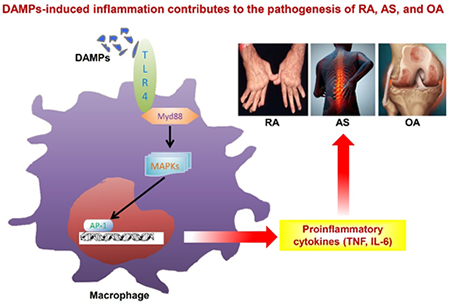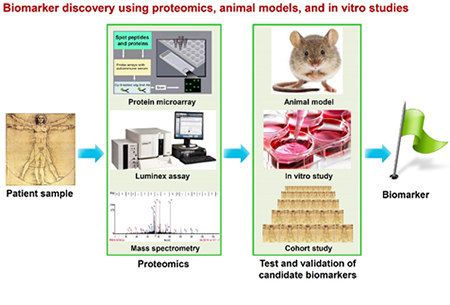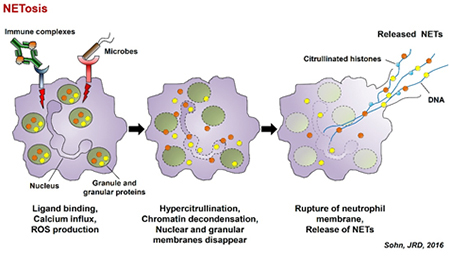Inflammation is our body's immune response to infections or tissue injuries. Basically, it is a protective response to eliminate pathogens and damaged cells, ultimately to restore health. However, when inflammation is inadequately controlled or fails to resolve properly, it can lead to excessive tissue damage and give rise to inflammatory diseases such as rheumatoid arthritis, atherosclerosis, and sepsis.
Endogenous products released as a result of tissue injury are referred to as Damage-Associated Molecular Patterns (DAMPs) or alarmins. These substances can elicit a noninfectious inflammatory response by interacting with pattern recognition receptors such as toll-like receptors (TLRs). Upon recognition of DAMPs, macrophages produce proinflammatory cytokines, including TNF and IL-6, which initiate the inflammatory process. Our research objective is to identify key regulators of inflammation and to investigate the underlying mechanisms of autoimmune diseases and other inflammatory diseases.
Endogenous products released as a result of tissue injury are referred to as Damage-Associated Molecular Patterns (DAMPs) or alarmins. These substances can elicit a noninfectious inflammatory response by interacting with pattern recognition receptors such as toll-like receptors (TLRs). Upon recognition of DAMPs, macrophages produce proinflammatory cytokines, including TNF and IL-6, which initiate the inflammatory process. Our research objective is to identify key regulators of inflammation and to investigate the underlying mechanisms of autoimmune diseases and other inflammatory diseases.
Our laboratory is pursuing the following research topics:
1.
Uncovering Inflammatory Triggers: Identifying and characterizing damage-associated molecular patterns (DAMPs) responsible for inducing inflammatory responses in autoimmune diseases, including rheumatoid arthritis and ankylosing spondylitis.
2. Understanding Inflammation Regulation: Investigating and characterizing key regulators of inflammation.
2. Understanding Inflammation Regulation: Investigating and characterizing key regulators of inflammation.
3.
Biomarker Development: Developing diagnostic and predictive biomarkers for autoimmune diseases and other inflammatory diseases.
4.
Exploring Pathogenic Links: Exploring the roles of citrullination and NETosis in the pathogenesis of autoimmune diseases, cardiovascular disorders, and cancer to uncover potential interconnections.
In collaboration with the Robinson Laboratory at Stanford University, we utilize proteomics, animal models of autoimmune diseases, and human patient samples to focus on both basic and translational research. Our goal aims at investigating the underlying mechanisms of autoimmune diseases and developing novel therapeutic strategies and biomarkers.
 Laboratory of autoimmunity
Laboratory of autoimmunity

